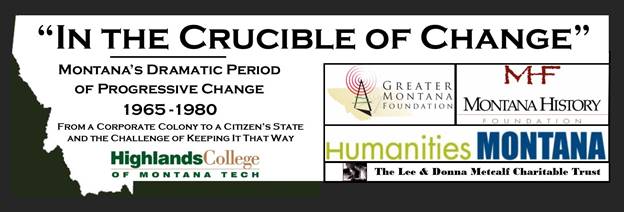
Transcript of Episode X: Organized Labor’s Role in the Big Political & Governmental Changes
This interview/discussion is a segment of the series “In the Crucible of Change” - Montana’s Dramatic Period of Progressive Change [1965-1980] - From a Corporate Colony to a Citizens’ State and the Challenge of Keeping It That Way - An Evan Barrett Telefilm Series; Produced by: Highlands College/Montana Tech & Orphan Girl Productions (Evan Barrett); Executive Producers: Evan Barrett & John Garic; Host/Moderator: Evan Barrett; Produced in the studios of Helena Civic Television (HCTV) – Production unit: Kirsten Faubion, Stephen Maly, Dave Clarke, Kelsea Kimerly, Lauren Fredrickson, Jeanie McLean-Warden; Opening Voice Recording - Ian Hadley; Photos: Montana Historical Society Photo Archives - Tom Cook; Personal Photo Archives of Evan Barrett; Music: “Living Room Jam” & “Island Breeze” - Richard H. Kuschel - The Recording Center - Missoula, Montana; “Orphan Girl” used by permission of Headframe Spirits – John & Courtney McKee; Partially funded by Grants from Humanities Montana (an affiliate of the National Endowment for the Humanities), Montana History Foundation, and The Greater Montana Foundation (encouraging communication on issues, trends and values of importance to Montanans).
Abstract
Montana has a history of strong labor union membership and activity. In the 20th Century our state was among the most unionized in the nation. Beginning mainly in Butte with the on-going conflicts with The Anaconda Company, the battle for wages, benefits and safe working conditions eventually took on a broader mission involving public policy in the public arena. Whether it be good educational opportunities for the sons and daughters of workers and all Montanans or a tax structure that was fair to all Montanans, unions were at the front of the battle. Jim Murry joined that battle, first locally and then eventually as the head of labor in Montana for 23 years. He emerged on the state level at the beginning of the “In the Crucible of Change” period as political director of the AFL-CIO and was its chief from 1968 on. There was hardly a progressive battle in which he and labor were not fully engaged. He kept and broadened the progressive coalitions in Montana, which helped shape the results of the period. As the period closed, his leadership role was recognized to the degree that he was heralded by Lee Newspapers in 1982 as the most powerful and influential Montanan, other than the Governor. This film addresses the role of Murry and labor under his leadership on the big picture political and governmental items of the period.
